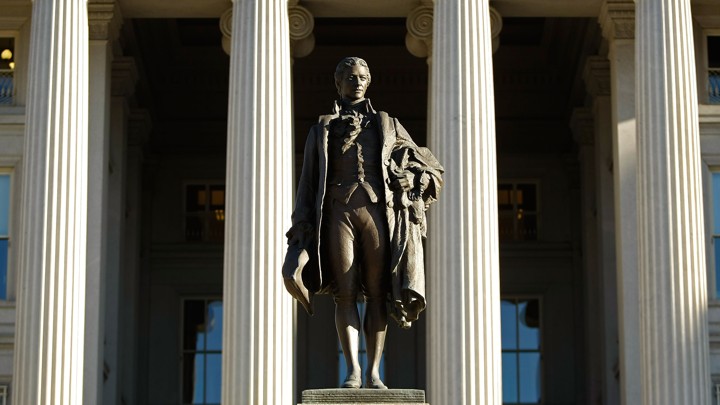The Electoral College Was Terrible From the Start
Before we get to the Electoral College, can we talk about Alexander Hamilton?
As a political figure, Hamilton was volatile, mercurial, choleric, vindictive, conniving, disloyal, and incontinent; those personal flaws eventually led to his death in a duel with Aaron Burr. We remember him because he was also smart, creative, dashing, and decisive. And if you’d had a case in front of a New York court, he’d have been the lawyer to hire. Brilliant doesn’t do justice to his advocacy skills.
But an advocate is what he was. If he were a car salesman today, he could convince you that you really don’t want the backup camera in your family minivan, because this baby here knows not to back into walls.
It’s in that context that we should read his panegyric, from “Federalist No. 68,” to the “mode of appointment of the chief magistrate of the United States” by the electors, a “small number of persons, selected by their fellow-citizens from the general mass, [who] will be most likely to possess the information and discernment requisite to such complicated investigations.” The electors, he assured us, will be “men most capable of analyzing the qualities adapted to the station, and acting under circumstances favorable to deliberation, and to a judicious combination of all the reasons and inducements which were proper to govern their choice.”
I love The Federalist. It is like a particularly well-done brochure for a Las Vegas timeshare, written to sell more than to inform. Hamilton, James Madison, and John Jay had one job: to ensure that the draft Constitution was ratified. The alternative, to these patriots, was disaster—the division of the new nation into hostile confederacies, and possibly the transformation of some or all of the states into clients of the European powers. There was no chance of a do-over; it was this Constitution or nothing. For this reason, The Federalist insists that every word, every comma, of the Constitution added up to the best of all possible rules in the best of all possible worlds.
However, the authors knew the document’s flaws. When Madison sent a copy to Thomas Jefferson, Jefferson discreetly replied: “In some parts it is discoverable that the author means only to say what may be best said in defense of opinions in which he did not concur.”
As long as George Washington was on the ballot, the electoral system worked fine. But when Washington retired in 1796, it hobbled his successor, John Adams. The original Constitution made the electoral-vote runner-up the vice president—Adams’s defeated opponent, Thomas Jefferson. Poor, gallant Adams could have used a friend at No. 2 but instead got a cunning foe. In the next election, in 1800, the system turned on Jefferson; because he and his running mate, Aaron Burr, got the same number of electoral votes, the election went to the House of Representatives, leading to 35 ballots over seven days—and very nearly to civil violence by outraged Jefferson supporters.
After that debacle, Congress proposed the Twelfth Amendment, ratified in 1804. It requires electors to vote for one president and one vice president. But it didn’t fix the real flaw: the electoral system is grossly undemocratic and devised in large part as a protection for slave states, which feared being outvoted in a popular-vote system. In fact, after Adams, what contemporaries called “the slave seats” ensured the dominance of slave-master presidents for the next quarter century. Then, in 1824, it gave us the first president to lose the popular vote, the unfortunate John Quincy Adams.
In 1876, the system almost restarted the Civil War; a Republican-dominated “electoral commission” awarded a one-vote victory to the popular-vote loser, “His Fraudulency” Rutherford B. Hayes. In 1888, electors gave us another loser president, the forgettable Benjamin Harrison. More recently, in 2000 and 2016, the system produced popular-vote losers who rank among the worst presidents in American history. The misfire in 2016 was especially painful, in part because the beneficiary, Donald Trump, was so plainly unfit for office and in part because Hillary Clinton won the popular vote by nearly 3 million votes, the largest margin of any electoral-college loser in history.
Turns out the U.S. really needed that backup camera; without it, “we the people” are still backing into walls. But so smooth was that handsome salesman that generations of Americans keep insisting everything is fine.
In fact, between the 2016 election on November 8 and the scheduled electoral vote on December 19, a number of commentators assured Americans that it was for moments like this that the Founders had so wisely decided against a backup camera. The idea, they said, was that electors were to block unfit candidates. They could break their pledges to vote for their state’s winner, scatter enough votes that neither candidate would get a majority, and throw the election to the House, where high-minded lawmakers would surely choose someone other than Donald Trump. These mythical electors were called “Hamilton electors,” and the language of “Federalist No. 68” was deemed the “true” meaning of Article II of the Constitution.
In Colorado, which Clinton carried, one elector tried to vote for Ohio Governor John Kasich instead of Hillary Clinton; state officials discarded the vote, removed the elector, and referred him for prosecution on state charges. In Washington, three Clinton electors voted for Colin Powell and one for the Native American activist Faith Spotted Eagle. Under state law, their votes were recorded, but the secretary of state fined each elector $1,000 for violating the Washington elector-pledge law.
In May, the Washington State supreme court upheld the fines, reasoning that “the Constitution does not limit a state’s authority in adding requirements to presidential electors, indeed, it gives to the states absolute authority in the manner of appointing electors.” In August, the U.S. Court of Appeals for the Tenth Circuit issued a contrary decision, holding that Colorado’s actions violated the federal Constitution because
While the Constitution grants the states plenary power to appoint their electors, it does not provide the states the power to interfere once voting begins, to remove an elector, to direct the other electors to disregard the removed elector’s vote, or to appoint a new elector to cast a replacement vote. In the absence of such a delegation, the states lack such power.
I think the Tenth Circuit got it right. Electors aren’t state officials; precisely because they are such odd figures, staying close to the text of the Constitution is best. The text doesn’t tell us what an elector is (though we know he or she can’t hold any other federal office); it does tell us what states can do (control how electors are selected)—but it does not grant states any power after that. There is no context for any unwritten powers. Beyond the text is only chaos.
And that leads us to my problem with “Hamilton electors.” First, as noted above, I don’t think Hamilton believed the high popalorum he was selling in “Federalist No. 68,” and if he did, he was wrong. The Princeton political scientist Keith E. Whittington recently demonstrated that electors have more or less always functioned as party agents, not independent figures. I cannot imagine that any voter in 2016 went to the polls eager to give some unnamed fellow citizen a free choice among Clinton, Trump, Bernie Sanders, Kasich, Ron Paul, Powell, and Faith Spotted Eagle.
When Trump won the electoral contest, the republic was in danger. Would it have been saved by an Electoral College that sabotaged or reversed the result? Citizens should support such an electoral démarche, I think, only if they would also support a military coup to block Trump. Either alternative would inflict near-mortal damage on our system of elections.
Meanwhile, the residue of the Hamilton idea is a system more, not less, prone to misfiring. In the event of a near-tie next year, I can imagine that a losing candidate, or powerful forces backing him or her, would use bribery, threats, violence, and blackmail to try to flip one or two electors. The Constitution should not be read to empower such corruption, or to open the door to such chaos.
The electoral system is a disaster; those concerned with its dangers would do better to support the National Popular Vote Interstate Compact, under which states bind their electors to vote for the popular-vote winner. That has its own risks—a rogue legislature might try to violate its pledge. But they pale beside the Hamilton alternative.


No comments:
Post a Comment